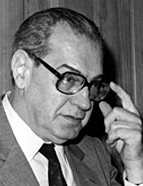

The 1970s and 1980s were Raymundo Faoro's most active decades in terms of intellectual production and public participation. Before the reissue of Os donos do poder in 1974, the lawyer from Rio Grande do Sul published his second book, Machado de Assis: A pirâmide e o trapézio [Machado de Assis: The Pyramid and the Trapezoid], in which he drew a political and social map of the Second Empire based on Machado's work. In 1977 he was elected president of the Ordem dos Advogados do Brasil (OAB) [Brazilian Bar Association], a role he held until 1979. As president of the OAB, Faoro became known for his intense participation in the struggle to restore the habeas corpus in the campaigns for amnesty and the revocation of the Institutional Acts, as well as to convene a constituent assembly. The latter was the subject of his third book Assembleia Constituinte: A legitimidade recuperada [Constituent Assembly: Legitimacy regained], published by Brasilense in 1981. At the time he became an active figure in the public debate on re-democratisation. He made frequent contributions to wide circulation newspapers and magazines. His most regular collaboration was with the magazines Época [Epoch], Senhor [Lord] and Carta Capital [Capital Letter], and the Jornal da República [Journal of the Republic], which he co-founded. His house became an important meeting point for personalities from different sectors of the political spectrum, such as Tancredo Neves and Luís Inácio Lula da Silva. The latter invited him to run for vice-president, which he declined. Although he was not an academic in the true sense, he had strong ties with the universities and took part in seminars and conferences, published articles in scientific magazines and even acted as a visiting professor in 1986, given the activities he carried out at Instituto de Estudos Avançados (IEA-USP) [Institute of Advanced Studies]. On that occasion, he gave the lecture Existe um pensamento político brasileiro? [Is there a Brazilian political thought?], which became the basis for his fourth book, published in 1994 under the same title. As in his previous works, Existe um pensamento político brasileiro? deals extensively with the thematic of liberalism and the historical relations between Brazil and Portugal. Presenting an interpretation that sought to uncover the limits, contradictions and ambiguities of liberalism in Brazil, Faoro noted that, even after Independence, there was no separation from Iberian political culture and that the so-called Brazilian liberalism was inorganic, statist and conservative, and imposed serious limits on the modernisation of Brazil.
This work is financed by national funds through FCT - Foundation for Science and Technology, I.P, in the scope of the projects UIDB/04311/2020 and UIDP/04311/2020.
